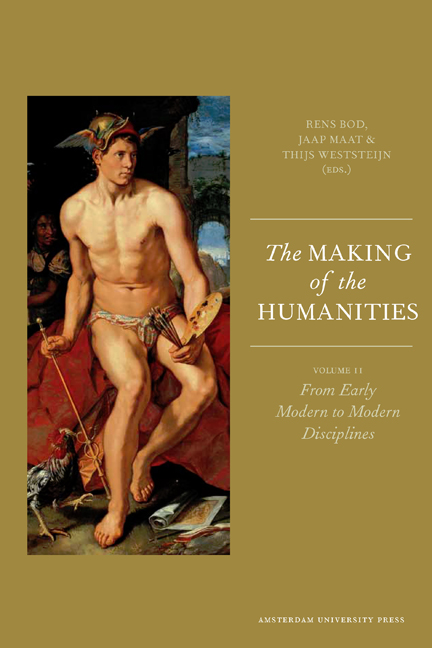Book contents
- Frontmatter
- Contents
- Introduction: The Dawn of the Modern Humanities
- I Linguistics and Philology
- II The Humanities and the Sciences
- III Writing History and Intellectual History
- IV The Impact of the East
- V Artworks and Texts
- VI Literature and Rhetoric
- VII Academic Communities
- Contributors
- List of Figures
- Index
Bopp the Builder. Discipline Formation as Hybridization: The Case of Comparative Linguistics
Published online by Cambridge University Press: 19 January 2021
- Frontmatter
- Contents
- Introduction: The Dawn of the Modern Humanities
- I Linguistics and Philology
- II The Humanities and the Sciences
- III Writing History and Intellectual History
- IV The Impact of the East
- V Artworks and Texts
- VI Literature and Rhetoric
- VII Academic Communities
- Contributors
- List of Figures
- Index
Summary
Discipline formation as hybridization
The historical study of discipline formation is a relatively underdeveloped research area in the historiography of science. It questions how the modern academic system of disciplines has emerged and how differentiation in it has taken place by investigating the factors involved in the construction or breaking down of disciplinary boundaries. This research focus is interesting for at least four reasons. First, the process of discipline formation is an ongoing process. Thus, knowledge about discipline formation in the past can help us to gain a better understanding of the process of discipline formation in the present. Second, the search for historical foundations of knowledge claims can benefit from an understanding of the frameworks in which these knowledge claims have come about. Many attempts have been made to capture this relationship for example by Toulmin (fields), Kuhn (paradigms) or Lakatos (research programmes). Preference is given here to the notion of the discipline because the term is less broad than other larger unit terms and hence offers the most concrete guiding lines for historical exploration. Third, the study of the differentiation of disciplines leads to considerations of their interactions and may point to interesting similarities between current disciplines that are often thought to be oceans apart. Fourth, taking the discipline as a space in which social and epistemic dimensions of science are deeply interwoven may provide a useful solution to the problems historiography of science started to face after the internal-external divide was given up.
The present contribution to the study of discipline formation is twofold. First, a perspective on discipline formation is proposed that I have called ‘hybridization‘. Second, in the main part of the paper a case study is explored, namely the emergence of historical and comparative linguistics (henceforth comparative linguistics).
- Type
- Chapter
- Information
- The Making of the HumanitiesVolume II: From Early Modern to Modern Disciplines, pp. 103 - 128Publisher: Amsterdam University PressPrint publication year: 2012
- 6
- Cited by



